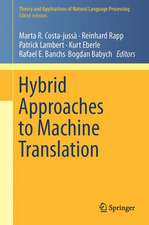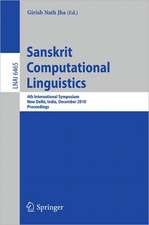Domain-Level Reasoning for Spoken Dialogue Systems
Autor Dirk Bühler, Wolfgang Minkeren Limba Engleză Hardback – 19 apr 2011
| Toate formatele și edițiile | Preț | Express |
|---|---|---|
| Paperback (1) | 640.69 lei 6-8 săpt. | |
| Springer – oct 2014 | 640.69 lei 6-8 săpt. | |
| Hardback (1) | 647.61 lei 6-8 săpt. | |
| Springer – 19 apr 2011 | 647.61 lei 6-8 săpt. |
Preț: 647.61 lei
Preț vechi: 809.51 lei
-20% Nou
Puncte Express: 971
Preț estimativ în valută:
123.92€ • 129.85$ • 102.44£
123.92€ • 129.85$ • 102.44£
Carte tipărită la comandă
Livrare economică 11-25 aprilie
Preluare comenzi: 021 569.72.76
Specificații
ISBN-13: 9781441997272
ISBN-10: 144199727X
Pagini: 185
Ilustrații: XIII, 185 p.
Dimensiuni: 155 x 235 x 18 mm
Greutate: 0.48 kg
Ediția:2011
Editura: Springer
Colecția Springer
Locul publicării:New York, NY, United States
ISBN-10: 144199727X
Pagini: 185
Ilustrații: XIII, 185 p.
Dimensiuni: 155 x 235 x 18 mm
Greutate: 0.48 kg
Ediția:2011
Editura: Springer
Colecția Springer
Locul publicării:New York, NY, United States
Public țintă
ResearchCuprins
1: Introduction.- 2: Fundamentals of Dialogue Systems.- 3: First‐Order Logic.- 4: Logic‐Based Domain Modelling.- 5: Interactive Model Generation.- 6: A Prototype Based on VoiceXML.- 7: Information State‐Based Dialogue Management.- 8: Revised Prototype and System Architecture.- 9: Conclusions and Future Directions
Notă biografică
Dirk Bühler holds a Ph.D. and MSc in Computer Science from the University of Ulm and University of Tübingen (Germany), respectively. His research interests concern the development and evaluation of user interfaces, including dialogue modelling and multimodality, domain modelling, knowledge representation, and automated reasoning. He worked at DaimlerChrysler, Research and Technology, Germany, from 2000 to 2002. He is now with SVOX Ulm (Germany).
Wolfgang Minker is a full‐time Professor at the University of Ulm, Institute for Information Technology (Germany). He received his Ph.D. in Engineering Science from the University of Karlsruhe (Germany) in 1997 and his Ph.D. in Computer Science from the University of Paris-Sud (France) in 1998. He has been Researcher at the Laboratoire d'Informatique pour la Mécanique et les Sciences de l'Ingénieur (LIMSI‐CNRS), France, from 1993 to 1999 and member of the scientific staff at DaimlerChrysler, Research and Technology (Germany) from 2000 to 2002. Dr. Minker is highly regarded in the speech and spoken language field and actively participates in major workshops on this related topic such as the just concluded, IEEE Workshop on Spoken Language.
Wolfgang Minker is a full‐time Professor at the University of Ulm, Institute for Information Technology (Germany). He received his Ph.D. in Engineering Science from the University of Karlsruhe (Germany) in 1997 and his Ph.D. in Computer Science from the University of Paris-Sud (France) in 1998. He has been Researcher at the Laboratoire d'Informatique pour la Mécanique et les Sciences de l'Ingénieur (LIMSI‐CNRS), France, from 1993 to 1999 and member of the scientific staff at DaimlerChrysler, Research and Technology (Germany) from 2000 to 2002. Dr. Minker is highly regarded in the speech and spoken language field and actively participates in major workshops on this related topic such as the just concluded, IEEE Workshop on Spoken Language.
Textul de pe ultima copertă
Domain-Level Reasoning for Spoken Dialogue Systems provides a logic‐based reasoning component for spoken language dialogue systems. This component, called the Problem Assistant is responsible for processing constraints on a possible solution obtained from various sources, namely user and the system's domain-specific information.
The authors present findings on the implementation of a dialogue management interface to the Problem Assistant. The dialogue system supports simple mixed‐initiative planning interactions in the TRAINS domain, which is still a relatively complex domain involving a number of logical constraints and relations forming the basis for the collaborative problem-solving behavior that drives the dialogue. The book also:
The authors present findings on the implementation of a dialogue management interface to the Problem Assistant. The dialogue system supports simple mixed‐initiative planning interactions in the TRAINS domain, which is still a relatively complex domain involving a number of logical constraints and relations forming the basis for the collaborative problem-solving behavior that drives the dialogue. The book also:
- Presents novel methods for enabling spoken dialogue systems to construct and manage complex tasks and interdependencies with different applications
- Describes late-breaking research on next-generation spoken dialogue systems
- Investigates how spoken dialogue systems may be improved in terms of usability and user friendliness
Caracteristici
Describes late-breaking research on next-generation spoken dialogue systems Investigates how spoken dialogue systems may be improved in terms of usability and user friendliness Presents novel methods for enabling spoken dialogue systems to construct and to manage complex tasks with different applications Includes supplementary material: sn.pub/extras























